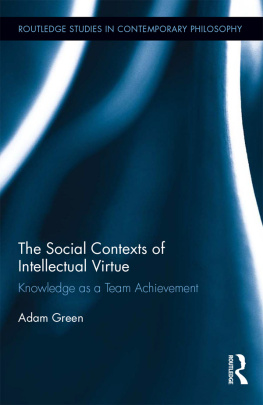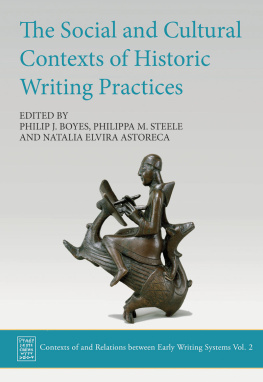Green Adam - The Social Contexts of Intellectual Virtue
Here you can read online Green Adam - The Social Contexts of Intellectual Virtue full text of the book (entire story) in english for free. Download pdf and epub, get meaning, cover and reviews about this ebook. year: 2016, publisher: Taylor & Francis Group, genre: Science. Description of the work, (preface) as well as reviews are available. Best literature library LitArk.com created for fans of good reading and offers a wide selection of genres:
Romance novel
Science fiction
Adventure
Detective
Science
History
Home and family
Prose
Art
Politics
Computer
Non-fiction
Religion
Business
Children
Humor
Choose a favorite category and find really read worthwhile books. Enjoy immersion in the world of imagination, feel the emotions of the characters or learn something new for yourself, make an fascinating discovery.
- Book:The Social Contexts of Intellectual Virtue
- Author:
- Publisher:Taylor & Francis Group
- Genre:
- Year:2016
- Rating:3 / 5
- Favourites:Add to favourites
- Your mark:
- 60
- 1
- 2
- 3
- 4
- 5
The Social Contexts of Intellectual Virtue: summary, description and annotation
We offer to read an annotation, description, summary or preface (depends on what the author of the book "The Social Contexts of Intellectual Virtue" wrote himself). If you haven't found the necessary information about the book — write in the comments, we will try to find it.
The Social Contexts of Intellectual Virtue — read online for free the complete book (whole text) full work
Below is the text of the book, divided by pages. System saving the place of the last page read, allows you to conveniently read the book "The Social Contexts of Intellectual Virtue" online for free, without having to search again every time where you left off. Put a bookmark, and you can go to the page where you finished reading at any time.
Font size:
Interval:
Bookmark:

This book reconceives virtue epistemology in light of the conviction that we are essentially social creatures. Virtue is normally thought of as something that allows individuals to accomplish things on their own. Although contemporary ethics is increasingly making room for an inherently social dimension in moral agency, intellectual virtues continue to be seen in terms of the computing potential of a brain taken by itself. Thinking in these terms, however, seriously misconstrues the way in which our individual flourishing hinges on our collective flourishing.
Greens account of virtue epistemology is based on the extended credit view, which conceives of knowledge as an achievement and broadens that focus to include team achievements in addition to individual ones. He argues that this view does a better job than alternatives of answering the many conceptual and empirical challenges for virtue epistemology that have been based on cases of testimony. The view also allows for a nuanced interaction with situationist psychology, dual-processing models in cognitive science, and the extended mind literature in the philosophy of mind. This framework provides a useful conceptual bridge between individual and group epistemology, and it has novel applications to the epistemology of disagreement, prejudice, and authority.
Adam Green is an assistant professor of philosophy at Azusa Pacific University. His work ranges over epistemology, the philosophy and cognitive science of religion, and philosophical psychology. His previous work on social epistemology has appeared in American Philosophical Quarterly, Synthese, Episteme, and Philosophical Explorations.
Routledge Studies in Contemporary Philosophy
For a full list of titles in this series, please visit www.routledge.com
80The Cognitive Basis of Aesthetics
Cassirer, Crowther, and the Future
Elena Fell and Ioanna Kopsiafti
81Interactive Justice
A Proceduralist Approach to Value Conflict in Politics
By Emanuela Ceva
82The Epistemological Skyhook
Determinism, Naturalism, and Self-Defeat
Jim Slagle
83Time and the Philosophy of Action
Edited by Roman Altshuler and Michael J. Sigrist
84McTaggarts Paradox
R. D. Ingthorsson
85Perspectives on Ignorance from Moral and Social Philosophy
Edited by Rik Peels
86Self-Reflection for the Opaque Mind
An Essay in Neo-Sellarsian Philosophy
T. Parent
87Facts and Values
The Ethics and Metaphysics of Normativity
Edited by Giancarlo Marchetti and Sarin Marchetti
88Aesthetic Disinterestedness
Art, Experience, and the Self
Thomas Hilgers
89The Social Contexts of Intellectual Virtue
Knowledge as a Team Achievement
Adam Green

First published 2017
by Routledge
711 Third Avenue, New York, NY 10017
and by Routledge
2 Park Square, Milton Park, Abingdon, Oxon OX14 4RN
Routledge is an imprint of the Taylor & Francis Group, an informa business
2017 Taylor & Francis
The right of Adam Green to be identified as author of this work has been asserted by him in accordance with sections 77 and 78 of the Copyright, Designs and Patents Act 1988.
All rights reserved. No part of this book may be reprinted or reproduced or utilised in any form or by any electronic, mechanical, or other means, now known or hereafter invented, including photocopying and recording, or in any information storage or retrieval system, without permission in writing from the publishers.
Trademark notice: Product or corporate names may be trademarks or registered trademarks, and are used only for identification and explanation without intent to infringe.
Library of Congress Cataloging in Publication Data
Names: Green, Adam, 1981 author.
Title: The social contexts of intellectual virtue : knowledge as a team
achievement / by Adam Green.
Description: 1 [edition]. | New York : Routledge, 2016. | Series:
Routledge studies in contemporary philosophy ; 89 | Includes
bibliographical references and index.
Identifiers: LCCN 2016038389 | ISBN 9781138236356 (hardback :
alk. paper)
Subjects: LCSH: Virtue epistemology. | VirtueSocial aspects.
Classification: LCC BD176 .G74 2016 | DDC 121dc23
LC record available at https://lccn.loc.gov/2016038389
ISBN: 978-1-138-23635-6 (hbk)
ISBN: 978-1-315-30259-1 (ebk)
Typeset in Sabon
by Apex CoVantage, LLC
To Monica
La bellezza chio vidi si trasmoda
non pur di l da noi, ma certo io credo
che solo il suo fattor tutta la goda.
(Dante, Paradiso XXX: 1921)
In a book on social dependence and virtue, it is only fitting to include a full list of those from whom I have benefited over the years this project has developed and to acknowledge that whatever defects there may be in these pages, they have been in spite of some very generous and able assistance. Unfortunately, my list will be very imperfect.
Those who through either comments on the text or conversation have improved and refined the work done here include: Charity Anderson, Marco Benasso, Matthew Benton, Katherine Dormandy, Julien Dutant, Christian Feldbacher, Georg Gasser, Sanford Goldberg, John Greco, Johannes Groessl, Thomas Grundmann, Joachim Horvath, Christoph Jaeger, Jens Kipper, Lukas Kraus, Winfried Loeffler, Anne Sophie Meincke, Teri Merrick, Bruno Neiderbacher, Dennis Okholm, Josef Quitterer, Joshua Rasmussen, Jonathan Reibsamen, Anna Rosenbaum, Edmund Runggaldier, Kent Staley, Eleonore Stump, Patrick Todd, Rico Vitz, Woldai Wagner, Steve Wilkens, Daniel Wehinger, Lars Weisbrod, David Woodruff, Linda Zagzebski as well as a couple of exceptionally generous and helpful referees. For hosting talks related to what would become this project, I would also like to thank audiences at the University of Amsterdam, University of Arkansas at Little Rock, Bentley University, Bogazici Unviersity, the University of Cologne, the University of Innsbruck, the University of Nancy, and Western Washington University.
I would like to thank Andrew Beck, Andrew Weckenmann, and their team at Routledge for their invaluable assistance in shepherding this manuscript to publication.
Material from the following four essays reappears in chapters of this book. All is reprinted with permission.
feature material drawn from Extending the Credit Theory of Knowledge. Philosophical Explorations 15 (2012): 135146.
is based on Deficient Testimony Is Deficient Teamwork. Episteme 11 (2014): 213227.
is largely comprised of Monitoring, Testimony, and a Challenge from Social Psychology. American Philosophical Quarterly 51 (2014): 2738.
Finally, contains Evaluating Distributed Cognition. Synthese 191 (2014): 7995.
The original research for this book was conducted as part of a postdoctoral research fellowship through the Analytic Theology project hosted by the University of Innsbruck. I am wowed by the generosity of the selection committee for awarding the St Lewis candidate a fellowship despite my John Wayne accented Kinder-Deutsch. The postdoc was funded by the Templeton Foundation to whom I am likewise deeply indebted. The opinions expressed in this book are my own and do not necessarily reflect those of the Templeton Foundation.
Font size:
Interval:
Bookmark:
Similar books «The Social Contexts of Intellectual Virtue»
Look at similar books to The Social Contexts of Intellectual Virtue. We have selected literature similar in name and meaning in the hope of providing readers with more options to find new, interesting, not yet read works.
Discussion, reviews of the book The Social Contexts of Intellectual Virtue and just readers' own opinions. Leave your comments, write what you think about the work, its meaning or the main characters. Specify what exactly you liked and what you didn't like, and why you think so.











